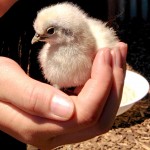Dumplings stakeholder consultation

A few weeks back, in an impatient and self-absorbed move, I ordered dinner for myself and two colleagues as soon as we entered the dumpling bar of choice, without consultation.
Having drunk our way through the evening I was now too hungry to wait to eat, colleague #1 was too bladdery to wait to go to the toilet, and colleague #2 too out-of-focus to read the menu. Being a regular at the restaurant I knew the dishes well and so proceeded to chose a selection of pork and shrimp dumplings (steamed and pan fried for diversity), as well as some fantastic hand-made noodles with pork in a soy-based sauce. Having decisively shouldered the responsibilities as required, and taken care of the unpleasantries, I felt we could now move to more important matters (as soon as #1 returned from the loo that is). What I had not taken into account was that both of my dining companions were vegetarians.
Merde!
This lack of stakeholder consultation (the importance of which I should have learned through my various public servant roles) led to a good belly laugh at my expense and an interesting social situation when I offered to offload a fresh plate of dumplings to the neighbouring table of young HK girls (results: pan fried pork 0 – steamed prawn delicacies 6), but also my wondering whether vegetarianism in Australia had spread so far as to infect public servants. Surely NGOs had that market cornered.
Census fail
Unfortunately, I couldn’t find any conclusive evidence of the changing demography of the vegetarian community to satisfy my curiousity. In fact, I couldn’t even find much data on whether vegetarianism was spreading. However, the trend of meat consumption in Australia is of more interest to me. After all, for moral and environmental reasons, that the total amount of meat consumed is of more importance than the disparity of its consumption. In other words, I think it a better tactic that everyone decrease their meat consumption, even with a stable level of vegetarians, than increasing the number of vegetarians without decreasing consumption in the non-veggo community.
How has Australia’s meat consumption changed over the last decade or so?
My assumption was that due to the growing awareness of issues such as health (red meat and colons), moral (queue a variety of docos on animal rights and current animal mistreatment), and environmental (beef and dairy being one of the biggest contributors to domestic-consumption carbon emissions), consumption of meat in Australian households would have decreased slightly over the past decade. This was also backed up by my anecdotal evidence of being surrounded by vegetarians at dinner tables (even though I hang around a lot less bleeding hearts than I used to!).
Superbite me
From the late 1970s up until 1998 we had a great publication called Apparent Consumption of Selected Foodstuffs (by the ABS), but it’s no longer produced. So, to see the change over the past decade, I did some fairly rudimentary analysis. Based on Household Expenditure figures deflated by CPI (ie: inflation), I tried to work out the change in consumption of different food groups for Australians and found the following:Consumption of “meats” has increased by about 7% per capita. This includes all meats (beef, octopus, spam, kangaroo, barramundi, brains, chooks, bacon, lamb, etc etc etc) which were consumed at home..We also eat 7% more veggies, 11% more fruits and nuts and 15% more eggs! On the other hand we eat 6% less dairy products and 10% less carbs. Sounds to me like Atkins won!
“Meats” tell a story unto themselves.
Red meats (beef, veal, lamb and mutton) are taking a battering, decreasing by almost 20%, while fish and seafood increased by 19%. The story of the day, however, is the original white meat. Chicken consumption per capita has increased by 60% in the last decade, and that doesn’t even include Nandos.
So, if there are more vegetarians amongst us, they are getting lost in the battery hens. But as far as environmental impact is concerned it appears we’re (very) slowly turning in the right direction. Even though we are consuming more of most things (bad), we seem to be consuming more of the less bad things (veggies, fruit, seafood and chicken), and less of the more bad things (red meats and dairy).
It seems to me that, ironically, the plummeting price of chicken, which probably occurred due to their terrible conditions, has had a much larger impact on our domestic emissions than any keep-cup/green-bag/car-pooling initiative out there.
















